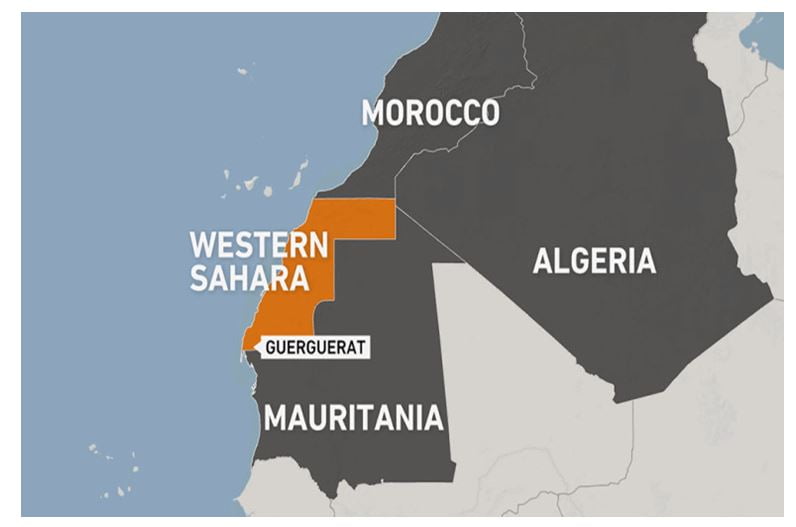UPSC Articles
INTERNATIONAL/ SECURITY
Topic: General Studies2:
- International Events and its ramification.
- Effect of policies and politics of developed and developing countries on India’s interests
Morocco-Israel deal
Context: Morocco has become the fourth Arab country to normalise ties with Israel in five months.
On December 10, U.S. President Donald Trump announced the deal, claiming that the series of normalisation agreements between Arab countries (the UAE, Bahrain, Sudan and now Morocco) and the Jewish state was bringing peace to West Asia.
In October, as parts of its deal to get Sudan to normalise ties with Israel, Washington removed Sudan from its ‘State Sponsor of Terrorism’ list, of which it made been a part for over 27 years.
What does Morocco get in return?
- In return for Morocco’s decision to establish formal ties with Israel, the S. has recognised Moroccan sovereignty over Western Sahara, a disputed territory in northwestern Africa, which has been under Moroccan control for decades.
- Morocco has long been campaigning internationally, using economic pressure and diplomacy, for recognition of its claims to Western Sahara.
- It got what it wanted from the deal with Israel, a country with which it had developed covert ties for decades.

Image Source: Aljazeera
What is the history of Western Sahara dispute?
- Western Sahara is large, arid and sparsely populated region that shares a border with Morocco, Algeria and Mauritania and has a long Atlantic coast was a Spanish colony. The region is home to the Sahrawi tribe.
- In the 1970s, when international and local pressure mounted on Spain to vacate its colonies in Africa, Libya and Algeria helped found a Sahrawi insurgency group against the Spanish rule in Western Sahara.
- In 1975, as part of the Madrid Accords with Morocco and Mauritania, Spain decided to leave the region, which was then called Spanish Sahara.
- According to the accords, Spain would exit the territory before February 28, 1976 and until then, the Spanish Governor General would administer the territory, with help from two Moroccan and Mauritanian Deputy Governors.
- Both Morocco and Mauritania moved troops to Western Sahara to assert their claims.
- Sahrawi insurgency group (Polisario Front) backed by Algeria continued the guerilla resistance, demanding their withdrawal. On February 27, 1976, a day before Spain ended its presence, the Polisario Front declared the Sahrawi Arab Democratic Republic (SADR) in Western Sahara.
- The SADR has been recognised by several African countries and is a member of the African Union.
What is UN Court’s view on the dispute and the basis of Morocco’s claim?
- Morocco and Mauritania had laid claims to Western Sahara even when it was a Spanish colony.
- In 1974, the International Court of Justice was asked by the U.N. General Assembly to look into the legal ties, if any, that existed between Western Sahara and Morocco and Mauritania at the time of its colonisation by Spain in the 19th century.
- The court found no evidence “of any ties of territorial sovereignty” between the Western Sahara and either Morocco or Mauritania, but stated that there were “indications” that some tribes in the territory were loyal to the Moroccan Sultan.
- In its conclusion, the court endorsed the General Assembly Resolution 1541 that affirmed that to ensure decolonisation, complete compliance with the principle of self-determination is required.
- But King Hassan II of Morocco hailed the court’s opinion as vindication of country’s stand and moved troops across the northern border to Western Sahara. Mauritania joined in later. It set the stage for a three-way fight with the Polisario Front resisting both countries.
How did the conflict progress over the decades?
- The three-way conflict lasted for almost four years. In August 1979, Mauritania signed a peace treaty with Polisario, bringing the country’s military involvement in Western Sahara to an end.
- When Mauritanian forces withdrew from the southern part of the desert that they had occupied, Morocco swiftly advanced troops.
- The war continued between Moroccan troops and the Polisario Front.
- In 1991, when a ceasefire was finally achieved, Morocco had taken control of about 80% of the territory. The independence referendum, promised in the 1991 ceasefire, is yet to take place
- The war had forced almost 200,000 Sahrawis to flee the territory to neighbouring Algeria, where Polisario is running squalid refugee camps
- The SADR is operating largely from the eastern flank of Western Sahara and the refugee camps.
- Moroccan troops have built a huge sand wall called Berm, from the Atlantic coast of Western Sahara to the mountains of Morocco, dividing the territories they control from that of Polisario.
What impact will the Israel deal have on the conflict?
- The normalisation deal between Morocco and Israel itself will not have any direct bearing on Western Sahara.
- But the concession the U.S. has given to Morocco — Washington’s recognition of Moroccan occupation of Western Sahara in return for Morocco’s agreement with Israel — could flare up the conflict.
- The uptick in hostilities in the region would further destabilise Western Africa and undermine decades worth of efforts by both the US and France to rid the region of Islamist insurgencies.
- Recently, Morocco launched an offensive into the U.N.-controlled buffer zone between the two sides and in return, Polisario said it would resume armed conflict.
- After the Trump administration’s recognition of Morocco’s claim, Polisario said it would continue fighting until Moroccan troops are forced to withdraw.
- The S. move would upset Algeria, the biggest backer of Polisario.
- Among the countries that condemned the U.S. decision is Russia, which said the recognition of Moroccan sovereignty over Western Sahara “is a violation of international law”.














